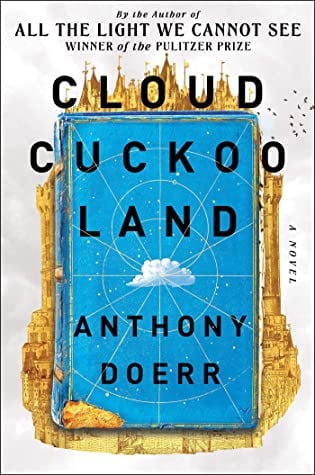I'll blend last month's notes into the new notes for this month.
All of us except Francis liked the book a lot. He did not like the way the author constantly switched back and forth between so many characters and time frames, so he didn't finish reading it. He is also not a big fan of fiction. I agree that the book seemed too scrambled. It took me a long time to get a feel for the multiple story lines. Andrea suggested that it might help to skip chapters to stay with one story line for a longer stretch, then go back and focus on another story line.
Joe loved the book and considers it one of the best that he has read lately. He thought that Anna and Omier were remarkable characters.
Tom liked the book enough that he watched various interviews of Anthony Doerr online and got a good appreciation of how Doerr put the book together.
Jim liked how the Diogenes fable was used to tie all of the story lines together.
I liked the way the history of the book by Diogenes was described, how the book survived over the years. I also liked the description of how a major library was built in Constantinople by requiring that any book that entered the city had to have a copy made and left in the city.
Andrea liked the science fiction aspect of the future part of the story.
We liked the different aspects of strength demonstrated by each of the main characters.
I liked the detailed description of Seymour, one of the main characters in modern times, who was autistic and was extremely sensitive from birth in all of his senses, touch, taste, smell, hearing and vision. He had a very difficult time even being around other people until he got a set of noise blocking headphones.
Several people liked the way that each of the characters changed through the course of the book. We discussed how Zeno is shown as a young man in the Korean War and then later as an 80-year old, but all of the other characters are only shown as young people.
We liked how Omier and Anna end up together and how well Omier treats Anna after rescuing her after the fall of the city.
Andrea thought that Seymour's redemption was an interesting turn. His additions to the world map program were very interesting.
We discussed how lucky it was that some books from thousands of years ago survive until today because of the way that they were kept in major libraries like Constantinople, copied by monks in monasteries, etc. Tom brought up the fact that books written on velum survived much better than those written on paper or papyrus. I brought up the fact that in many cases, though, hand copied books ended up with copying errors or intentional changes.
This led to comments about how the school children that Zeno was helping to put on a play of Diogenes' "Cloud Cuckoo Land" were allowed to modify the story to something that they liked better and to fill in the missing pieces.
At this point we spent a little while talking about Ukraine and other topics.
Next month's meeting will be on April 21st in Joe's garden (assuming warm dry weather.) The book for next month is "Sapiens: A Brief History of Humankind" by Yuval Noah Harari. It is available in local libraries, but appears to be in high demand. Also note that there are 3 different books available. One of them is the full text of the book. The other two are coffee table graphic editions of the first and second halves of the book.
For May we will be reading "The Hundred-Year Walk: An Armenian Odyssey" by Dawn Anahid MacKeen. It is available in many local libraries and can also be found cheaply at online used book stores.
Happy reading!
Leroy
ACOM Book Club for March 2022
 The ACOM Book Club met via Zoom on Thursday, March 17, 2022. Attendees were Jim, Margaret, Andrea, Francis, Tom, Joe, Tashina, Peter, Cynthia and me. We continued last month's discussion of "Cloud Cuckoo Land" by Anthony Doerr.
The ACOM Book Club met via Zoom on Thursday, March 17, 2022. Attendees were Jim, Margaret, Andrea, Francis, Tom, Joe, Tashina, Peter, Cynthia and me. We continued last month's discussion of "Cloud Cuckoo Land" by Anthony Doerr.
As an introduction to the book, I'll paraphrase what Wikipedia has to say about it:
"Cloud Cuckoo Land is the story of five characters spanning eight centuries. In the fifteenth-century Byzantine Empire, Anna is a young seamstress living in Constantinople, and Omier is a village boy conscripted into the Ottoman army which is preparing to take the city. In the present day, Zeno, a Korean War veteran, works in a library in Idaho translating Ancient Greek texts, while Seymour, a disturbed autistic youngster, becomes caught up with a group of eco-terrorists. In the twenty-second century, Konstance is a young girl aboard the Argos, a generation starship heading for a planet called Beta Oph2.
Their stories are bound by an Ancient Greek codex entitled Cloud Cuckoo Land that each of the five characters discovers and finds solace in. It is a fictional book supposedly written by real Greek novelist Antonius Diogenes in the second century, and tells the story of Aethon, a shepherd on a quest to find the fabled paradise in the sky. In his travels, he is transformed into a donkey, a sea bass, and finally a crow, which allows him to fly to the gates of the city in the clouds."